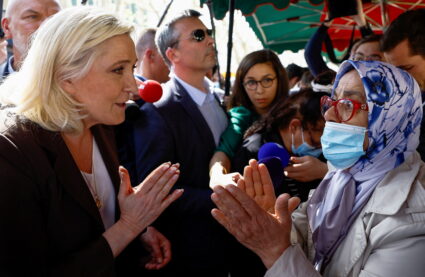
Bad Bunny has used his platform to applaud immigrants, sing about Puerto Rico's identity and turmoil and denounce U.S. immigration…

PERTUIS, France (AP) — Muslim headscarves took center stage in France's presidential campaign Friday amid far-right candidate Marine Le Pen's push to ban them in the country with western Europe's largest Muslim population.
Both she and rival Emmanuel Macron, facing a tightly contested April 24 runoff, were confronted by women in headscarves who asked why their clothing choices should be caught up in politics. Macron wouldn't ban religious clothing, but he has overseen the closure of several mosques and Islamic groups. And many Muslims feel the presidential campaign has unfairly stigmatized their faith.
At a farmers' market in the southern town of Pertuis, a woman in a blue-and-white head covering approached Le Pen as the candidate weaved past fishmongers and vendors to greet supporters.
"What is the headscarf doing in politics?" the woman asked.
READ MORE: The only Arab American museum in the nation is 'much more than a building'
Le Pen defended her position, calling the headscarf a "uniform imposed over time by people who have a radical vision of Islam."
"That's not true," countered the woman. "I started to wear the veil when I was an older woman … For me it is a sign of being a grandmother." The woman noted that her father had served in the French military for 15 years.
Le Pen's opposition to the headscarf has encapsulated what her critics say makes her dangerous to French unity, by stigmatizing millions of French Muslims. Le Pen would also slash immigration and wants to outlaw ritual slaughter, which would restrict French Muslims' and Jews' access to kosher and halal meat.
WATCH MORE: WATCH: How American Muslims have been represented in popular culture post-9/11
Macron too debated a woman in a Muslim headscarf on Friday in a lively exchange on broadcaster France-Info. He sought to distance himself from Le Pen by saying he would not change any laws, but defended an existing ban on headscarves in schools as part of France's secular principles.
The woman, Sara El Attar, said she had felt insulted by previous comments by Macron where he'd suggested that headscarves destabilize relations between men and women.
French women "have been castigated these recent years for a simple scarf, without any leader deigning to denounce this injustice," she said. And she repeated the argument that many veiled women in France make: That people mistakenly think they're veiled not through personal choice, but because men make them wear headscarves.
Macron sought to defend his record. "For me personally, the question of the headscarf is not an obsession," Macron said.
But critics say his government stoked prejudice against Muslims by cracking down on what it has claimed are efforts by some Muslims to carve out spaces in France for stricter interpretations of Islam. The government has gone after some schools, mosques and Islamic associations.
Sustain our coverage of culture, arts and literature.